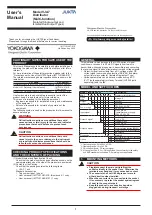
4. DESCRIPTION OF FRONT PANEL AND
CONNECTION OF HANDY TERMINAL
4.1 Front Panel
The communications connector in the front panel is used for
setting up parameters through the Handy Terminal. The alarm-1
and alarm-2 LEDs light up if an alarm occurs (those LEDs are
provided only when the output-2 is specified for alarm output (the
output-2 suffix code is T).)
Alarm indicator lamp
(for alarm 1)
Communication connector
Alarm indicator lamp
(for alarm 2)
4.2 Connector for Communication
Connect the modular jack-to-connector adapter to the connection
cable (with 5-pin connector) of the Handy Terminal and then
connect this adapter to the communications connector of the
distributor.
< How to connect with the setting tool>
JUXTA communication
cable with 5-pin
connector
Modular jack
conversion
adapter
Dedicated adapter
Dedicated cable
<How to connect with the setting tool>
JUXTA
VJ Series
PC with the
VJ77 installed
JHT200
Handy Terminal
• Use the VJ77 of version R2.02.01 or later.
•
The modular jack conversion adapter does not come with the
JHT200 Handy Terminal. It is sold separately.
5. SETTING PARAMETERS
Set the parameters using a PC (VJ77 Parameter Setting Tool) or
the Handy Terminal. Refer to “7. LIST OF PARAMETERS” in this
manual and the User’s Manual for VJ77 PC-based Parameters
Setting Tool (IM 77J01J77-01E) or the User’s Manual for JHT200
Handy Terminal (IM 77J50H01-01EN).
5.1 Settings Related to Inputs and Outputs
5.1.1
Square Root Extraction
Select SQR in
[D41: LINEARIZE]
. To linearize the signal, set
[D41: LINEARIZE]
to SQR. Not to linearize the signal, set
[D41: LINEARIZE]
to OFF.
5.1.2 Low-cut Function
Set this parameter when an input signal is square-root
extracted for use. Set it in
[D42: LOW CUT]
numerically.
•
Setting range: A range of 0 to 100% of input range
•
Setting resolution: 0.1%
Input signal (X)
0
Low-cut point
Hysteresis
(Fixed to 0.2%)
Y=X
Output signal (Y)
5.1.3 Linearization
Set the breakpoint linearization in
[D41: LINEARIZE]
.
Select “ON” to use the breakpoint linearization.
Select “OFF” not to use the breakpoint linearization.
Set the breakpoints data.
Set the input breakpoints data in
[M01: X TABLE]
to
[M32: X
TABLE]
.
Set the number of breakpoints data in
[M33: MAX POINT]
.
Set the output breakpoints data in
[N01: Y TABLE]
to
[N32: Y
TABLE]
.
• Setting condition of breakpoints data
Maximum number of breakpoints: 32
Setting range: −6 to 106% (both input and output)
• Set a relationship between the input and output at % value
to the span.
• With 4 significant digits; can be set to the second place of a
decimal point.
• For input: −6.00 % ≤ X
0
< X
1
< X
2
… X
n-1
< X
n
≤ 106.0%
• For output: −6.00 % ≤ Y
0
to Y
n
≤ 106.0%
5.1.4 Software Filter
Set the software filter in
[D57: S/W FILTER]
.
OFF, LOW, MIDDLE, HIGH (default value: OFF)
When LOW, MIDDLE, or HIGH is selected, a first-order filter
equivalent to 100 ms, 300 ms, or 1 s is inserted in the input.
5.1.5 Direction of Output Action
Analog output signals can be reversed. To reverse the signal
from output-1, set
[D50: OUT1 DR]
to REVERSE. For
output-2, set
[D51: OUT2 DR]
to REVERSE. To return the
output-1 signal to normal, set
[D50: OUT1 DR]
to DIRECT.
For output-2, set
[D51: OUT2 DR]
to DIRECT.
5.2 Settings Related to Communication
Function
Set the following parameters when output-2 is specified
for communication function. For more information on the
communication function, see the Instruction Manual for VJ Series
Communication Function (IM 77J1J11-01E).
5.2.1 Communication Protocol
Set the communication protocol by selecting from among PC-
LINK, PC-LINK WITH SUM, MODBUS ASCII, MODBUS RTU,
and LADDER in
[F01: PROTOCOL]
.
5.2.2 Communication Address
Set the address number of the distributor numerically in a
range of 1 to 99 in
[F02: ADDRESS]
.
5.2.3 Baud Rate
Set the baud rate by selecting from among 1200, 2400, 4800,
9600, 19200, and 38400 bps in
[F03: BAUD RATE]
.
5.2.4 Parity
Select and set NONE, EVEN, or ODD in
[F04: PARITY]
.
5.2.5 Data Length
Select and set 7 bits or 8 bits in
[F05: DATA LEN]
.
5.2.6 Stop Bit
Select and set 1 bit or 2 bits in
[F06: STOP BIT]
.
5.2.7 Input Decimal Point Position
Number of digits of decimal places (setting of D register
[D0003]) can be set.
Select and set among 0 to 5 digits in
[F07: INPUT DEC PT]
.
3
IM 77J01A07-01E
5th Edition






